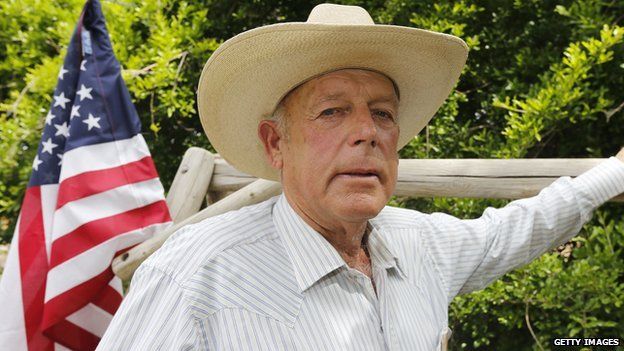Cliven Bundy expresses racist views
- Published
- comments

Adam Nagourney's in-depth profile of Cliven Bundy in the New York Times has liberals crowing and many conservatives scrambling to distance themselves from the Nevada rancher who recently led an armed standoff against government agents.
The article begins with a recap of Mr Bundy's confrontation with federal officials who tried to round up and auction his cattle to pay for more than $1m (£600,000) in fees and fines for unauthorised grazing on federal land.
Now that the government has backed down, media interest in Mr Bundy has dwindled a bit, as only a handful of press are still showing up at his rallies and press conferences.
On Saturday, it seems, Nagourney and a photographer were the only journalists present as Mr Bundy decided to venture into social commentary. Here's how the Times reporter recounts what happened next:
"I want to tell you one more thing I know about the Negro," he said. Mr. Bundy recalled driving past a public-housing project in North Las Vegas, "and in front of that government house the door was usually open and the older people and the kids - and there is always at least a half a dozen people sitting on the porch - they didn't have nothing to do. They didn't have nothing for their kids to do. They didn't have nothing for their young girls to do.
"And because they were basically on government subsidy, so now what do they do?" he asked. "They abort their young children, they put their young men in jail, because they never learned how to pick cotton. And I've often wondered, are they better off as slaves, picking cotton and having a family life and doing things, or are they better off under government subsidy? They didn't get no more freedom. They got less freedom."
Cue record screech sound, followed by footsteps of reporters rushing to their phones to call Republican politicians who had backed Mr Bundy's cause.
Nevada Senator Dean Heller, who called Mr Bundy's group of supporters "patriots", "completely disagrees with Mr Bundy's appalling and racist statements, and condemns them in the most strenuous way," according to his spokesman.
Kentucky Senator Rand Paul, who also expressed support for Mr Bundy, gave a statement to Business Insider: "His remarks on race are offensive, and I wholeheartedly disagree with him."
Commentators on the left have been quick to point out that conservatives can't so easily back away from a man they had previously embraced as a folk hero.
Amanda Marcotte, writing for the Raw Story, said Mr Bundy's remarks were "boilerplate blame-the-victim nonsense from Republicans who are trying to blame black people themselves for racial disparities instead of systemic racism".
"But he failed to employ their standard code words and euphemisms, so he's an embarrassment now," she says.
Mr Bundy's statements shouldn't be surprising, writes the Atlantic's Ta-Nehisi Coates.
"White supremacy is one of the most dominant forces in the history of American politics," he says. "In a democracy, it would be silly to expect it to go unexpressed."
"Prick a movement built on white supremacy and it bleeds ... white supremacy," he adds.
Not all conservatives were backing away from Mr Bundy, however.
TruthRevolt's Ben Shapiro compared Mr Bundy's situation to that of Edward Snowden, who leaked information about US government surveillance programmes.
"Snowden being a traitor did not change importance of his revelations," he tweeted. "Bundy being a racist does not change importance of his situation."
Conservative radio host Dana Loesch tried to put Mr Bundy's statements in a more sympathetic light:
I hope no one is surprised that an old man rancher isn't media trained to express himself perfectly. He seems to be decrying what big government has done to the black family - which big government has negatively affected not just the black family, but all families regardless of ethnicity - so perhaps he included that in his remarks against big government? I'm just trying to figure out how he even got to the point of discussing it and, yes, it's justified to have a healthy suspicion of the New York Times.
One of the primary concerns that critics of Mr Bundy's actions have expressed since the standoff began more than a week ago is that federal enforcement will back down in the face of armed resistance.
Already, a new land controversy was brewing in northern Texas, where ranchers we objecting to a move by the federal government to claim jurisdiction over some land near the Red River. Some were pointing to it as the next Bundy-style faceoff.
With Mr Bundy's recent statements, however, the Nevada rancher's appeal as a conservative hero may be diminished. Whether the movement that he represents will be tarnished along with him remains to be seen.
UPDATE: A video of Mr Bundy's controversial comments is now available on YouTube.
UPDATE #2: On Thursday Mr Bundy appeared to stick by his comments about blacks during an interview on the Peter Schiff Show, although he emphasised that this is all just speculation on his part:
I said I'm wondering if they're better off under government subsidy and their young women are having the abortions, and their young men are in jail, and their older women and their children are sitting out on their cement porch without nothing to do.
And I'm wondering: are they happier now under this government subsidy system then they were when they were slaves when they was able to have their family structure together and chickens and a garden and the people had something to do? And so in my mind I'm wondering: are they better off being slaves in that sense or better off being slaves to the United States government in the sense of a subsidy? The statement was right. I am wondering.
- Published16 April 2014
- Published20 December 2013